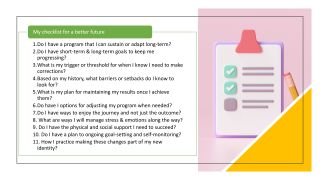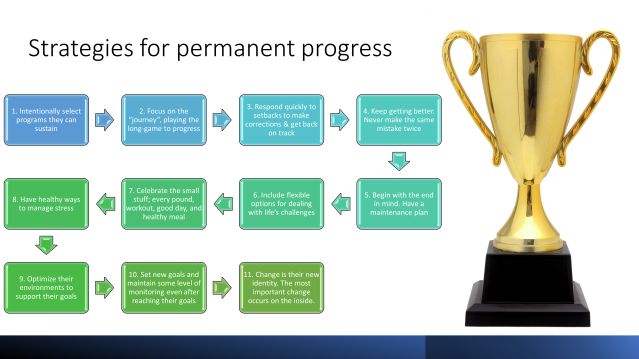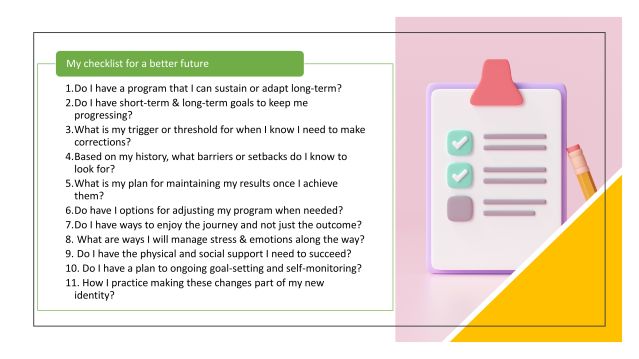Motivation
The Keys to Lasting Progress
If you want results that last, you'll need strategies that endure.
Posted August 18, 2023 Reviewed by Tyler Woods
Key points
- People engaging in self-improvement can be organized into two groups: initiators and sustainers.
- Although initiators receive the lion's share of self-help attention, sustaining change is equally difficult.
- The ability to sustain and make continued progress requires strategies to overcome known barriers.
Among people seeking meaningful improvements in their health, happiness, and quality of life, there are two distinct groups. Each group faces different barriers to success.
1. The first group—capturing most of the attention of the self-help world—are the initiators. People in this group have goals and dreams but struggle to get started. They frequently face barriers related to motivation, procrastination, perfectionism, and the basic lack of time or energy to make even initial changes. If the journey of a thousand leagues begins with the first step, this group routinely finds that the first step is also the hardest.
2. The second group—perhaps even larger in number, yet receiving much less self-help attention—are the sustainers. Unlike people in the initiator group, sustainers began their improvement journeys and enjoyed results ranging from modest to magnificent, only to face struggles related to relapse, plateaus, old habits re-emerging, and a lack of long-term tools for maintenance and continued progress. Not only do sustainers face different barriers than initiators, they require different strategies.
Let's provide some much-needed assistance to people in the sustainer group. Whether you are a person who commits to New Year's resolutions that never seem to last, someone who has tried "every diet in the book," has a history as a yo-yo exerciser, or is struggling to sustain recovery from an addictive substance, it is important to know that your struggles are not personal.
Sustainers number in the tens of millions, for example, just in the U.S. Maintaining behavior change is inherently difficult. In fact, as difficult as it is for many people to get started towards their personal goals, the problems facing sustainers may be even more daunting, according to the science on behavior change.1-2
To enjoy results that last, it is critical to identify the barriers specific to sustaining behavior change and apply strategies that are equally specific to overcoming these barriers.
Barriers and breakthrough strategies for sustainers.

There are many reasons that people struggle to sustain healthy behavioral changes, according to the literature. And the barriers differ between people, with some primarily encountering one or a small number of obstacles, while other people face many.
Visually seeing all these barriers in one list may provide some relief from self-blame: There are a lot of ways for even the best-intentioned behavior change efforts to go awry:
- We frequently implement programs that are "doomed to fail" due to being too extreme, depriving, or time/energy intensive
- We focus excessively on immediate results, a focus that inevitably sets us up for long-term disappointment
- We ignore or rationalize small behavior regressions (e.g., gaining a few pounds, missing a couple of workouts), allowing them to become big regressions
- We embody Einstein's infamous definition of insanity and keep doing the same things while hoping for different results
- We put all our energy into getting results and rarely make specific plans for how we'll keep them
- Our plans are too rigid, offering no outcome but relapse once life throws us a curve ball
- We lack ways to feel good about achieving our smaller, day-to-day milestones, causing us to give up long before we approach our bigger goals
- Negative emotions trigger old coping habits unless we learn better ways of managing them
- We overemphasize the role of discipline and willpower, overlooking the powerful influence of our physical and interpersonal environments
- We drop our guard once we've reached our goals, usually causing our behaviors to gradually drift back toward old standards
- We focus only on making external changes in our behavior or relationships without making parallel changes in our thinking and core beliefs

Fortunately, there are complementary strategies to address each of these common long-term success barriers.
For many people embarking on personal improvement journeys, it is even helpful to codify and individualize this list of barriers and solutions from the start, such as in the checklist shown in the photo below.

Summary
Self-improvement goals benefit from two distinct sets of strategies: strategies designed to help you get started and strategies to help you maintain progress and achieve even greater heights.
If you are among the millions who've struggled to maintain hard-fought health and quality of life changes, adapting the latter evidence-based strategies may be exactly what you need to reach your next level of results.
References
1. Bouton ME. Why behavior change is difficult to sustain. Prev Med. 2014 Nov;68:29-36. doi: 10.1016/j.ypmed.2014.06.010.
2. Brandon TH, Vidrine JI, Litvin EB. Relapse and relapse prevention. Annu Rev Clin Psychol. 2007;3:257-84. doi: 10.1146/annurev.clinpsy.3.022806.091455.


